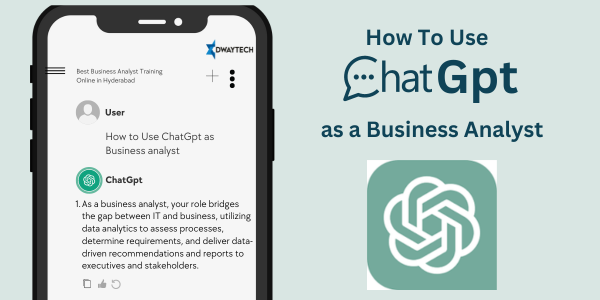As a business analyst, your role bridges the gap between IT and business, utilizing data analytics to assess processes, determine requirements, and deliver data-driven recommendations and reports to executives and stakeholders. With the advent of artificial intelligence, the landscape of business analysis is rapidly evolving. One of the most exciting developments in this space is ChatGPT, an AI language model developed by OpenAI. This powerful tool can transform how business analysts work, offering enhanced efficiency, productivity, and insights.
Understanding ChatGPT
What is ChatGPT?
ChatGPT is a state-of-the-art language model that uses machine learning to understand and generate human-like text based on the input it receives. It’s designed to engage in conversations, answer questions, and provide detailed information on various topics.
How ChatGPT Works
At its core, ChatGPT operates on natural language processing (NLP) and machine learning principles. It has been trained on vast amounts of text data, enabling it to understand context, infer meaning, and generate relevant responses. This makes it a versatile tool for various applications, including business analysis.
Key Features of ChatGPT
- Contextual Understanding: ChatGPT can comprehend and maintain the context of a conversation, making it highly effective for detailed and complex interactions.
- Versatility: It can handle various tasks, from answering simple queries to providing in-depth analysis.
- Customization: ChatGPT can be trained and fine-tuned to meet specific needs and preferences.
Why Business Analysts Should Use ChatGPT
Benefits of Using ChatGPT in Business Analysis
ChatGPT offers several advantages for business analysts:
- Efficiency and Productivity: Automating routine tasks and providing quick access to information can save valuable time.
- Cost-Effectiveness: Reducing the need for manual analysis and reporting can lower operational costs.
- Enhanced Insights: Leveraging AI for data analysis can uncover deeper insights and trends that might be missed through traditional methods.
Getting Started with ChatGPT
Setting Up ChatGPT for Business Analysis
To begin using ChatGPT, you must:
- Sign Up: Create an account on the OpenAI platform.
- Access the API: Obtain API access to integrate ChatGPT with your existing tools.
- Configure Settings: Customize the settings to suit your specific business analysis needs.
Integrating ChatGPT with Existing Tools
ChatGPT can be integrated with various tools that business analysts use, such as CRM systems, data visualization tools, and project management software. This integration ensures seamless workflows and enhances the overall efficiency of your analysis processes.
Basic Commands and Functionalities
Once set up, you can start using basic commands to interact with ChatGPT. For example:
- Data Analysis: “Examine the Q1 2024 sales figures.”
- “Create a report on customer feedback trends,” says the report generation prompt.
- Market Research: “What are the latest trends in the tech industry?”
Use Cases of ChatGPT for Business Analysts
Data Analysis and Interpretation
ChatGPT can handle large datasets, making it ideal for analyzing data and interpreting results. It can identify patterns, trends, and anomalies, providing valuable insights for decision-making.
Report Generation
One of the most time-consuming tasks for business analysts is report generation. ChatGPT can automate this process, creating detailed and customized reports based on the data provided.
Market Research and Trend Analysis
Keeping up with market trends is crucial for business success. ChatGPT can assist in conducting market research and analyzing trends, offering predictive analytics to stay ahead of the competition.
Process Automation
By automating routine tasks, ChatGPT enhances workflow efficiency. Tasks such as data entry, scheduling, and follow-ups can be managed effortlessly, allowing analysts to focus on more strategic activities.
Detailed Use Cases
Data Analysis and Interpretation
How ChatGPT Can Analyze Large Datasets
ChatGPT’s advanced NLP capabilities enable it to sift through vast amounts of data quickly. It can summarize findings, highlight key metrics, and provide actionable insights.
Examples of Data Analysis Tasks
- Sales Data Analysis: Identifying sales trends, forecasting future sales, and analyzing customer behavior.
- Financial Analysis: Evaluating financial statements, performing ratio analysis, and identifying cost-saving opportunities.
Report Generation
Automating Report Creation
ChatGPT can generate comprehensive reports based on predefined templates or specific requirements. This automation ensures consistency and accuracy.
Customizing Reports
Reports can be tailored to include relevant data, visualizations, and insights. ChatGPT allows you to specify the format, content, and structure of your reports.
Market Research and Trend Analysis
Using ChatGPT for Competitive Analysis
ChatGPT can gather and analyze data on competitors, providing a detailed overview of their strengths, weaknesses, opportunities, and threats (SWOT analysis).
Predictive Analytics with ChatGPT
Leveraging machine learning, ChatGPT can predict future trends based on historical data. This talent is very helpful for formulating strategic plans and decisions.
Process Automation
Automating Routine Tasks
ChatGPT can handle repetitive tasks such as data entry, appointment scheduling, and email responses, freeing up time for more critical activities.
Enhancing Workflow Efficiency
Integrating ChatGPT into your workflow can streamline processes, reduce errors, and improve overall productivity.
Advanced Features of ChatGPT
Natural Language Processing
ChatGPT’s NLP capabilities allow it to understand and respond to complex queries, making it a powerful tool for business analysis.
Machine Learning Capabilities
ChatGPT continuously learns from interactions, improving its performance and accuracy over time. This makes it a dynamic and evolving tool.
Customization and Training of ChatGPT Models
Business analysts can train ChatGPT models to meet specific needs, ensuring that the AI provides the most relevant and accurate insights.
Integrating ChatGPT with Other Tools
CRM Systems
Integrating ChatGPT with CRM systems can enhance customer relationship management by providing real-time insights and automating customer interactions.
Data Visualization Tools
ChatGPT can work alongside data visualization tools to create interactive and informative visual representations of data.
Project Management Software
Integrating ChatGPT with project management software can improve task management, scheduling, and project tracking.
Best Practices for Using ChatGPT
Ensuring Data Accuracy
Regularly update and validate the data used by ChatGPT to ensure the accuracy of insights and recommendations.
Maintaining Data Privacy and Security
Implement robust security measures to protect sensitive business data and comply with relevant regulations.
Regularly Updating ChatGPT Models
Keep your ChatGPT models updated with the latest data and training to maintain high performance and relevance.
Challenges and Limitations
Understanding the Limitations of ChatGPT
While ChatGPT is a powerful tool, it’s essential to recognize its limitations, such as potential biases in the data and the need for human oversight.
Overcoming Common Challenges
Address challenges by combining ChatGPT’s capabilities with human expertise, ensuring a balanced and accurate analysis.
Future of ChatGPT in Business Analysis
Emerging Trends
The integration of AI in business analysis is set to grow, with new advancements making tools like ChatGPT even more powerful and versatile.
Potential Advancements
Future developments may include more sophisticated NLP, enhanced machine learning algorithms, and greater customization options.
Conclusion
ChatGPT represents a significant advancement in the field of business analysis. By leveraging its capabilities, business analysts can enhance efficiency, gain deeper insights, and make more informed decisions. As AI technology continues to evolve, the potential for tools like ChatGPT will only increase, making them indispensable assets for business analysts.
FAQs
What is ChatGPT?
ChatGPT is an AI language model developed by OpenAI that uses natural language processing to generate human-like text based on the input it receives.
How can ChatGPT improve business analysis?
ChatGPT can automate routine tasks, analyze large datasets, generate reports, and provide insights, making the business analysis process more efficient and effective.
Is ChatGPT secure to use for business data?
Yes, but it’s essential to implement robust security measures to protect sensitive data and ensure compliance with relevant regulations.
What are the costs associated with using ChatGPT?
The costs can vary depending on the level of usage and the specific plan chosen. To get the most precise information, it’s best to review OpenAI’s price specifics.
How can I get started with ChatGPT?
To get started, create an account on the OpenAI platform, obtain API access, and configure the settings to suit your business analysis needs.
Also, Useful Links:
Business Analyst Training Course Online Request Demo











